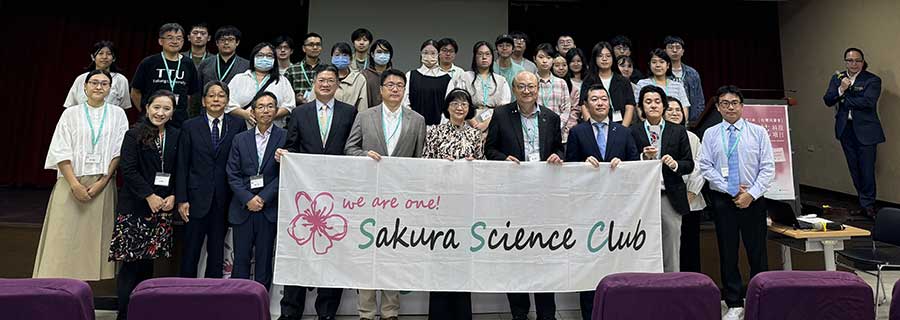Events
Onsite Event in Taiwan Assisted Members Wishing to Study or to Do Research in Japan
On November 9, 2024, the 3rd TSSCA (Taiwan Sakura Science Club Alumni Association) meeting was held at the lecture hall of the National Taiwan Normal University, School of Continuing Education. Forty alumni gathered to revive memorable friendship. First, Professor Sung Hui-Ling, Department of Chemistry, Division of Preparatory Programs for Overseas Students, who generously agreed to the use of the event venue this time, welcomed the participants. “This event is the third Sakura Science alumni reunion, and it is a valuable opportunity to deepen exchanges between Taiwan and Japan. I hope that all participants will enjoy this event to the fullest and seize the opportunity to visit Japan again in the future,” she remarked in the opening of the reunion.
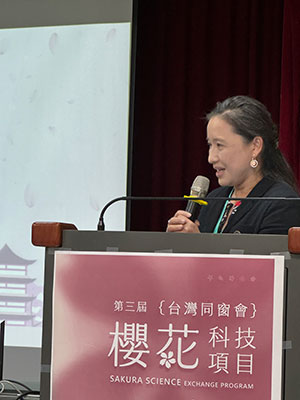
Next, the chair and president of TSSCA, Professor Peng Chi-How, National Taiwan University, Department of Chemistry, explained about the alumni association. He voiced that the TSSCA aims to promote exchanges with Japan, and encouraged participants to contact the Sakura Science Club if they need information or support for studying abroad in Japan or for doing research. Finally, he expressed his hope for the event to deepen the relationship between Taiwan and Japan and lead to the personal development of each participant.
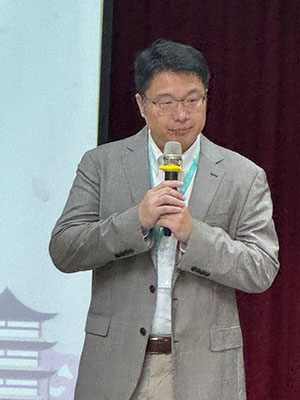
Department of Chemistry, National Taiwan University
From Japan Science and Technology Agency (JST), Mr. ITO Sotaro, Deputy-Director of Sakura Science Program Headquarters, introduced how the Sakura Science Program (SSP) has made a great contribution to exchanges between Japan and Taiwan. He pointed out that there have been very tightly-knit exchange between Japan and Taiwan in the areas of economy, culture, tourism, and that more than 2,000 students from Taiwan have participated in SSP so far. JST has been conducting SSP for 10 years, and in recent years, exchanges have increased, particularly in science and technology. “Exchange opportunities between Japan and Taiwan are special, and I believe such exchange between young people will be the foundation for building a stronger cooperative relationship. JST will continue to engage in endeavors to promote such interactive exchange," Mr. ITO concluded.
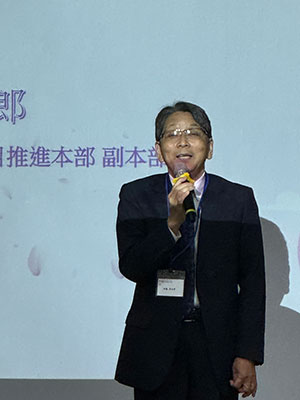
Japan Science and Technology Agency (JST)
Mr. HAYAKAWA Tomohisa of Japan-Taiwan Exchange Association, Taipei Office introduced that the association provides Taiwanese students with three-year-scholarships to study in Japan, utilizing various learning resources in Taiwan. The association aims to cultivate and educate next-generation leaders. He explained that government-sponsored scholarships for teachers have also been available since 1972, before the association was established, and that scholarships have been awarded to more than 3,100 people.
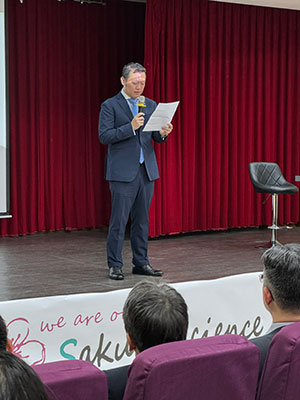
Japan-Taiwan Exchange Association, Taipei Office
K-12 Education Administration, Ministry of Education Division of Academic Senior High Education, Senior Executive Officer, Ms. I Hsiu-Chih, stressed the importance of science education, and mentioned foremost that SSP has been inviting young students to Japan every year since 2014, providing them with the opportunity to experience science and technology and engage in cultural exchange. “I think SSP is not just a project, but an international academic exchange platform. We place great importance on such opportunities for cross-border exchange, and hope to continue our cooperation in the future to benefit even more students,” she expressed her positive outlook.
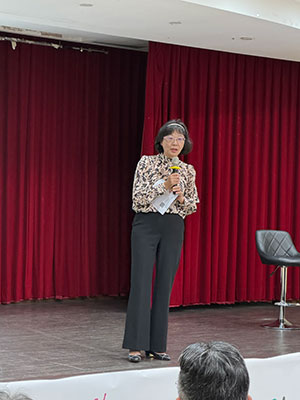
Ministry of Education Division of Academic Senior High Education
In his speech, Dean and Professor Kao Wen-Chung of National Taiwan Normal University, College of Industry Academia Innovation, spoke enthusiastically, about academic exchange. "What impressed me most about international academic exchanges is how participants can become friends with international students from various backgrounds. I think that once you set foot on Japanese soil, you will love this country very much. There is a lot to learn from Japanese people. At the same time, Taiwan has been very successful recently, and we are very proud of some sectors. For example, even in AI semiconductors, there are areas where we need to cooperate with Japan. I am sure that in the future, scientific interaction between Taiwan and Japan will become much closer. I encourage you to go to Japan to learn more about Japanese culture and take the opportunity to make friends."
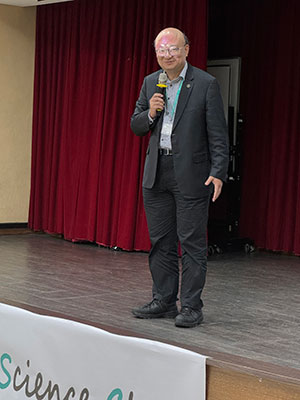
Using data from May 1, 2023, Mr. MIYAI Tomohiro of JASSO (Japan Student Services Organization), who lectured online, mentioned that there are 280,000 international students in Japan from more than 170 countries and regions. And among them, 6,988 students are from Taiwan, ranking sixth among all countries and regions. “International students can take advantage of the short-term study abroad programs via the Japanese universities they study at. Such programs may include corporate internship-type experiences. By studying at a Japanese university, they can acquire advanced knowledge and skills. They can also build international connections. When studying in Japan, the average living expenses for international students are about 20,000 Taiwan Dollars, in addition to tuition. International students can work part-time with government’s permission. And thus, 75% of international students living in Japan do work part-time.” He gave actual examples in detail. There are several steps to the process of studying in Japan, such as choosing a university, preparing application documents, and taking the Japanese Language Proficiency Test (JLPT). Mr. MIYAI called out to the participants to check JASSO’s official website for more details.
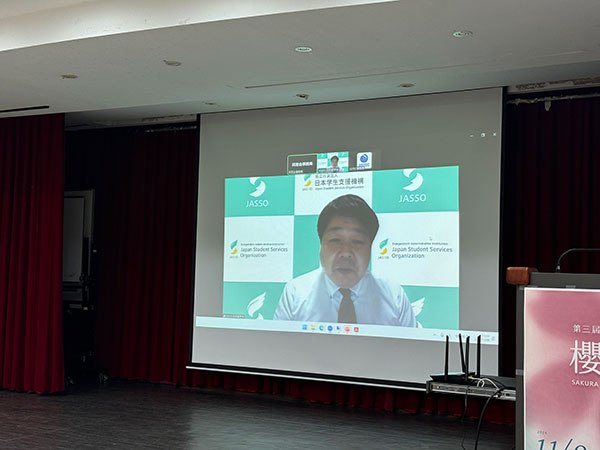
JASSO (Japan Student Services Organization)
Mr. TSUMURA Satoshi and Ms. Yang Ya Chien from Waseda University, International Center Taipei, explained why Waseda is suitable to international students. “Waseda is a university that is highly regarded worldwide, and is also characterized by its strong employability. It also boasts an attractive study abroad program for students who want to study in an international setting. A variety of programs are available, including programs taught in English only, and combined programs where students can study in both Japanese and English. There are also various support organizations to help students' life, such as a center for international students, a Japanese Language Education Center and so forth. In addition to Waseda University's internal scholarship, there are also many scholarships from external organizations, and there are also programs to reduce the financial burden on students.” Both speakers provided practical information like the entrance examination guidelines, application procedures, and necessary documents.
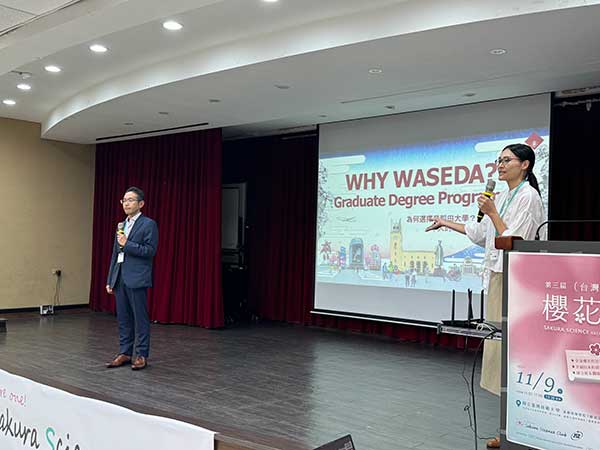
Waseda University, International Center Taipei
Mr. KADOTA Kentaro and Ms. Hsieh Tai-Chieh from Japan-Taiwan Exchange Association, explained about the association’s original scholarship system. It targets Taiwanese students who wish to conduct research in Japan, and there are two programs; long-term and short-term. The long-term program is a scholarship for continuing on to graduate school in Japan to conduct research, while the other is for short-term research at Japanese universities and research institutes. The association also provides various information on studying in Japan─life in Japan, research, and choosing a university─and promotes mutual exchange between students through workshops and seminars on Japan.
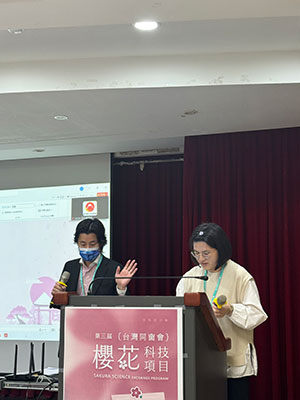
Japan-Taiwan Exchange Association
To close the session, Professor Chen Jiun-Rong of the School of Nutrition and Health Sciences at Taipei Medical University, expressed his aspirations. "What impressed me most about participating in the Sakura Science Program (SSP) was the enthusiasm and sincerity of Japanese researchers. Their passion for research is a great inspiration to me and has had a major impact on my research activities. Taiwan and Japan have deep historical and cultural ties, and I believe that we are partners who should cooperate in the field of science and technology. Exchange platforms such as SSP are very important in promoting exchange among the younger generation, and in building cooperative ties. I would like to work with everyone here to build an even closer network. I am confident that exchanges between Japan and Taiwan will continue to develop in the future," he concluded his remarks with a bright outlook.
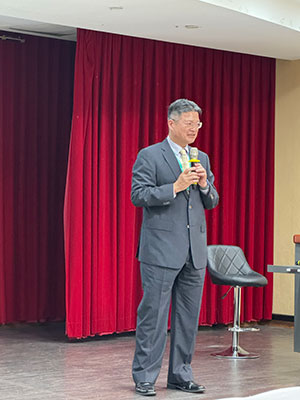
School of Nutrition and Health Sciences, Taipei Medical University
At the final networking session, participants asked numerous questions one after another, to know more about university entrance exams, scholarships, and life in Japan. The series of questions led to heated discussions paired with good advice. As each person shared information and resolved specific questions, the conversation never ran out. The excitement continued well beyond the scheduled time limit. This networking session was extremely meaningful for participants who are aspiring to study in Japan, and provided a good opportunity to think about their future paths.
